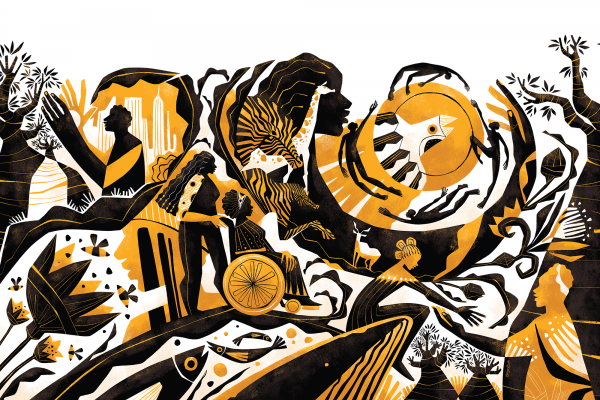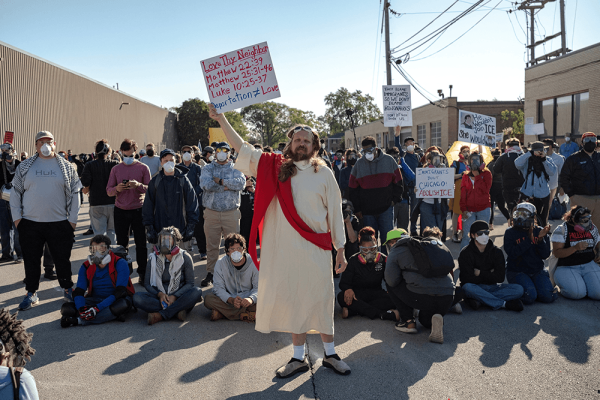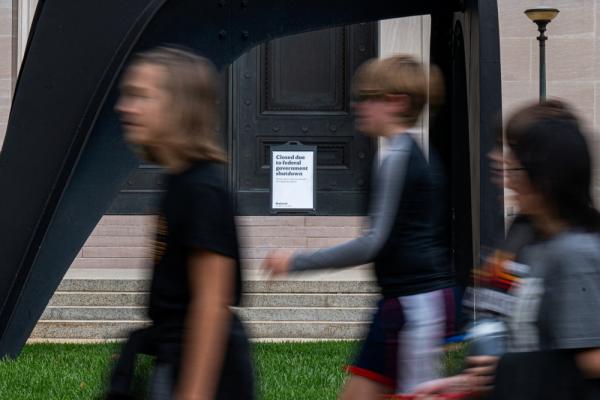In a real sense all life is interrelated. All [people] are caught in an inescapable network of mutuality, tied in a single garment of destiny. Whatever affects one directly, affects all indirectly. I can never be what I ought to be until you are what you ought to be, and you can never be what you ought to be until I am what I ought to be. ... This is the interrelated structure of reality. —Martin Luther King Jr.
WHEN I STUDIED abroad in South Africa in 1996, I learned much about the power of interdependence and mutuality. There I encountered and experienced the southern-African philosophy of ubuntu. Through Nelson Mandela’s moral leadership and embodiment of ubuntu, the nation was led through transformational change. Like Dr. King, Mandela refused to hate his enemies, including those who kept him imprisoned for 27 years, as he envisioned a future South Africa that included Black and white together.
Archbishop Desmond Tutu summarized ubuntu in what became a marker of both a movement and a philosophy: “I am because we are.” Mpyana Fulgence Nyengele, author of Cultivating Ubuntu, offers this definition: “Ubuntu is the substance and core being of a person and speaks particularly about the fact that we cannot be fully formed as human beings in isolation.” Rather, as Stephen Lewis, Matthew Wesley Williams, and Dori Baker share in Another Way, Nyengele explains that “it is only through our communal participation and interaction with other people that we begin to develop trust, compassion, caring, humility, kindness, and forgiveness, which are all qualities of what it means to be human and humane toward others. Similar to the fruit of the spirit, ubuntu is possible because ntu or Spirit ‘orients persons toward life-giving choices, actions and behaviors.’ ... Therefore, ‘ubuntu promotes and enhances the abundance of human life in community and beyond.’”
I think of ubuntu as an expanded, vivid version of the Golden Rule: We are called to do unto others as we would have them do unto us. Or, as King so often put it, we are to be “our brothers’ and sisters’ keeper.”
Interdependence is not often considered a cornerstone of the American ethos, but it lies at the heart of what binds us together, in both a moral and a practical sense. It constitutes an essential beatitude of building the Beloved Community. A greater understanding of how our lives are inextricably linked opens up new possibilities for developing empathy toward others and helps us counteract the atomized, overly individualistic excesses of American culture. Ubuntu also provides a needed lens to understand the ways in which all parts of the globe have become increasingly interdependent. Both our security and our prosperity are increasingly tied to the rest of the world. Global crises such as climate change and the COVID-19 pandemic require shared global leadership and cooperation.
The Beloved Community requires deepening our sense of interdependence. It involves a deeper appreciation that we are in this together socially, politically, and economically. Ubuntu interdependence forms the basis of expressions of solidarity and helps individuals and communities move beyond naked self-interest and hyper-individualism. Properly understood and practiced, ubuntu interdependence provides a compelling rationale behind many public-policy commitments that are central to promoting the common good, such as a strong and effective social safety net, universal access to good health care, strengthening families so they can thrive, and ensuring that every child has access to a quality education.
This kind of ubuntu interdependence provides a social and moral framework. It offers an organizational and governmental policy framework for fighting poverty and expanding economic justice and opportunity for all Americans, including advancing a greater commitment to the triple bottom line of generating benefit for shareholders, employees, and the broader society within the private sector.
South Africa provided the term ubuntu, but many other cultures and communities, such as Eastern Christianity and Asian culture, can teach us about the meaning and centrality of interdependent communities. According to Dr. Grace Ji-Sun Kim, “Asian culture is communal. The community and family are more important than the individual. In the communal setting in Korea, one never talks about ‘my school’ or ‘my church’; it is always ‘our school’ or ‘our church,’ where they use the Korean word ouri. Likewise, one will say ‘our husband’ or ‘our sister’ to express the communal culture of society. This communal culture is also connected to jeong, a term that refers to the breaking down of the personal in order to build on the connectedness of people.” Author and activist Kathy Khang echoed this sentiment as she shared with me, “There’s a strong sense of kinship, often tied to an understanding of jeong, which is difficult to put into words but speaks to an immediate sense of connection and mutual understanding, of being seen.” When Khang considers this in light of the Beloved Community, she imagines “that everyone is your auntie or uncle. In other words, everyone is looking out for you and is in your business, for better or for worse.”
Cultures from across Latin America also share a deep sense of communal interdependence. Rev. Alexia Salvatierra speaks of how collective images are natural in Latin American culture based on the belief that just relationships naturally flow from our taking seriously that we are a family. In this notion of la familia is found a deep mutual understanding and commitment to each other, because “a family at its best is a Beloved Community.” Rev. Gabriel Salguero echoes this sentiment, describing la familia as “a radical social construct that shapes how we organize life.”
The Christian tradition is filled with references, stories, and metaphors that speak to this dynamic interdependence. Paul’s metaphor comparing the community of the church to the human body captures the essence of our interdependence. When Paul wrote his letter to the church at Corinth, he understood that its members ministered within a bustling city much like many of our cities today. Corinth was a commercial center of 600,000 people. From the dawn of Greek civilization, it was a strategic maritime port, a crossing of shipping lanes, and a meeting point between East and West. Corinth also earned a reputation for vice, as a place for hedonistic pleasure and ostentatious wealth. Behind this wealth were pervasive and severe poverty and a culture that often neglected the poor. And Corinthian society was so riddled with competitive individualism and disregard for the poor that this sensibility spilled over into the church, where feuding groups were built around the personalities and teachings of rival leading figures from different house churches. Instead of creating unity out of their diversity, the Corinthian church experienced division and rancor. Sadly, we see similar polarization today in our faith communities and our nation.
What Paul wrote about the human body—the connectedness of bones and sinews, its fragility and remarkable ability to support the whole—is truly a miracle, one that I’ve come to appreciate more fully in my middle age. I have experienced lower back problems over the past several years. It started when I threw out my back trying to prevent my son from being hit by a car as we came out of church. It took me three long years of dealing with frequent agonizing pain before I finally relented and signed up for physical therapy. Physical therapy gave me a profound appreciation for the true interdependence of the human body. I learned that to heal my lower back, I had to gain greater flexibility and strength in the muscles that connect to my back, from my hamstrings to my glutes and particularly my core. What is true for healing my back is also true for healing our ailing country.
Paul’s metaphor comparing the church to the functioning of the body is an image that applies to the health of our communities, our nation, and our world. The lesson of the body— interdependence—ties together three realizations and commitments:
• to protect the weakest, most vulnerable members of our society;
• to demonstrate an equal concern for one another; and
• to recognize that our security, our prosperity, and even our wholeness is tied to that of others.
“Those parts of the body that seem to be weaker are indispensable,” Paul comments, adding that “its parts should have equal concern for each other.” Finally, Paul reminds us that “if one part suffers, every part suffers with it; if one part is honored, every part rejoices with it” (1 Corinthians 12:22, 25–26).
After three years of physical therapy, I became overconfident and lazy. I stopped doing the very exercises that had helped so much and ended up reinjuring my back. The lesson I learned from my back is true for our society. If we stop protecting the most vulnerable among us and showing concern for one another, we will get stuck in a cycle of reinjuring ourselves and others. We will also be more susceptible to a politics that appeals to hate and fear and will retreat into partisan or ideological camps. As a result, embracing ubuntu interdependence is critical for restoring health to our democracy and building the Beloved Community.
There are many threats to our interdependence, including global climate change, which poses a signature challenge to living together on an interdependent planet. Poverty in all its forms and degrees assaults human dignity and represents a great test of our interdependence because, as Mahatma Gandhi said, “poverty is the greatest form of violence.” Dr. King understood that fighting poverty represented the next chapter, the next frontier, of the civil rights struggle. In his final book, Where Do We Go from Here: Chaos or Community? King wrote, “The time has come for us to civilize ourselves by the total, direct, and immediate abolition of poverty.” King’s words offer a searing and prophetic diagnosis of poverty and are as true and relevant today as when they were written more than 50 years ago. The sobering truth is that not nearly enough has changed in the intervening years. King wrote:
We have proceeded from a premise that poverty is a consequence of multiple evils: lack of education, restricting job opportunities; poor housing which stultified home life and suppressed initiative; fragile family relationships which distorted personality development. The logic of this approach suggested that each of these could be attacked one by one. ... At no time has a total, coordinated, and fully adequate program been conceived. As a consequence, fragmentary and spasmodic reforms have failed to reach down to the profoundest needs of the poor.
Fifty years ago, King understood that solutions to poverty will require a comprehensive approach that addresses root causes. Ubuntu interdependence teaches us that our nation’s health is inextricably linked to the thriving of all people. In particular, it teaches us that when the most vulnerable thrive, we all thrive. When one part of America suffers, all parts suffer with it. When one part rejoices, all parts rejoice with it.
This article is excerpted from A More Perfect Union: A New Vision for Building the Beloved Community by Adam Russell Taylor. Copyright © 2021 Broadleaf Books. Reproduced by permission.

Got something to say about what you're reading? We value your feedback!






